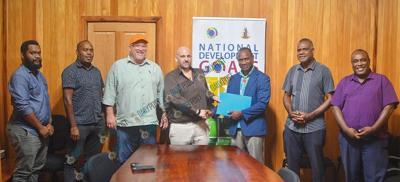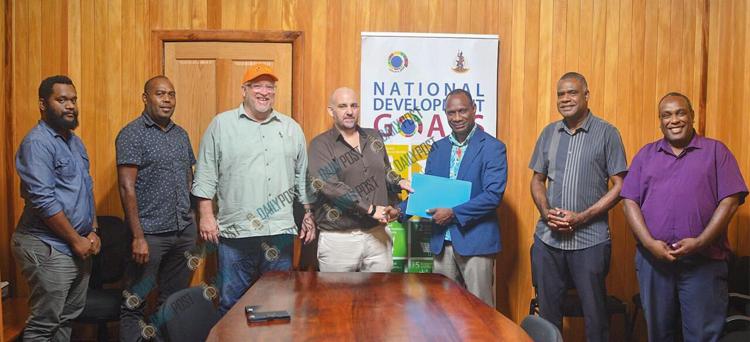
Vanuatu’s recently established coconut oil investment fund – the Crude Coconut Oil (CNO) Future Fund – has stepped forward to contribute over VT6 million to combat Coconut Rhinoceros Beetle (CRB) spread in Santo.
Acting Principal Biosecurity Officer, Leisongi Bulesulu, said these funds will empower and mobilise teams, expanding their surveillance and recording activities focused on minimising the spread of the infestation to a manageable level.
Director General (DG) of the Ministry of Agriculture, Livestock, Forestry, Fisheries and Biosecurity (MALFFB), Mr. Timothy Tumukon, said to his knowledge, this is the first case of the private sector proactively coming forward to offer support and assistance to combat the CRB.
“Thank you to the CNO Future Fund and we look forward to your continued support. We need more private sector stakeholders to follow this example and step up to help,” he said.
The island of Santo is one of the main engine rooms in the agriculture sector, and coconuts are one of the largest and most socially inclusive crops produced. Even though the CRB has been active throughout the South Pacific since the late 1990s and first detected on Efate in 2022, if left unmonitored, it can be devastating to plantations.
The CRB is an ongoing challenge, and the Departments of Biosecurity and Agriculture have worked tirelessly to contain the beetle to Efate. As part of these efforts, the MALAMPA Provincial Government Council recently released a public notice expanding restrictions on shipping movements, and with the CNO Future Fund’s support, the Biosecurity and Agriculture Departments are increasing land-based efforts to move as quickly as possible to mitigate the risk and manage the impact.
Seeing the threat to the domestic economy and individual livelihoods, CNO Future Fund approached the Department, offering practical and immediate action, thus demonstrating that Public Private Partnerships (PPPs) are a vital part of the country’s united response. As CRB has the potential to affect the entire nation, active involvement by the community is necessary for effective management of this situation.
As part of the Vanuatu Government’s “Capital Investment Immigration Plan” (CIIP), the CNO Future Fund is focused on commercialising Vanuatu’s coconut industry and assisting to deliver numerous standing government policies such as the “2030 Peoples Plan”, “Energy Sector Road-Map”, “Agriculture Sector Development Policy”, “Coconut Sector Plan”, and others. Sourcing market funding under the CIIP, the CNO Future Fund is currently implementing a 5-year strategic plan to generate 16,000,000 liters of CNO that can be harnessed to generate sustainable “Green Grid Power” production on Efate. Coconut oil for power is not a new initiative, and UNELCO have historically advanced significantly beyond proof of concept, running a 4MW coconut oil generator in Port Vila in the early 2000s.
Nationalised Vanuatu citizens and Directors of the CNO Future Fund Mr. Dan Agius and Mr. John Tonner were on hand to sign an agreement between the Department of Biosecurity and the CNO Future Fund to facilitate transparent and compliant procedures for collaborative efforts to support the ongoing management of the CRB. Mr. Agius, who handles the Marketing and Economic Stimulus Generation aspects of the Fund, said that in today’s market there is high demand for sustainable and renewable energy investments.
He said the CNO Future Fund is seeing an increased demand from the global market to participate in this exciting environmental Investment opportunity. From an economic standpoint, the Vanuatu Government will benefit by close to VT1,000,000,000 per annum in direct State Revenue. Once the Fund has rolled out the various stages of its strategy, the Provincial producers and growers are to share in over VT2,000,000,000 in sector stimulus.
The CNO Future Fund will generate enough coconut oil for UNELCO to combine with current solar and wind power infrastructure to allow Port Vila to go entirely “green” – in line with the Government’s 2030 Net Zero commitments. It is therefore economically, environmentally, and socially beneficial.
Speaking to the Daily Post, Mr. Tonner was excited to further elaborate on some of the grassroots benefits already achieved by the CNO Future Fund saying, “The CNO Future Fund has already secured enough stable CNO supply to power a 1MW Generator in Port Vila, and we are seeking further opportunities on Malekula, Santo, Malo, Epi, Ambrym, Pentecost, and the Banks to expand this volume to fuel the production of 2MW of sustainable green power.”
However, Mr. Tonner also cautioned, “We are not entirely sure what the hold-up is, but we can transition away from diesel today, we just need two specialised CNO Generators imported, and we can start.”
Expressing his optimism for the future of coconut oil production as a pillar of the domestic economy, Mr. Tonner said, “This program benefits everybody. Almost every Island can grow coconuts, so this is a grassroots opportunity to empower and commercialize our land delivering environmental, economic, social benefits right and me down to the village level.”
He added that it is time to move forward, saying, “we can learn from the past mistakes, stop talking and start doing, we must immediately commence the commissioning of coconut oil generators for grid power, now”.


